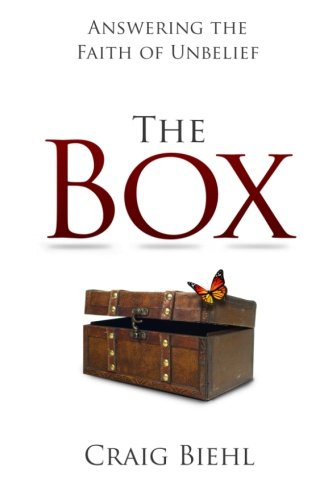Reviewed by Fred G. Zaspel
“How do you know that?” It’s a simple question, and a wise apologist will pursue it with vigor. You say that God does not exist? How do you know that? You say there is no evidence that God exists? How do you know that? Just how do you know what you claim to know?
Cornelius Van Til of course is famous for pressing this question, and his disciples continue to employ his presuppositional apologetic method effectively. Craig Biehl (ThM, Dallas Theological Seminary; PhD, Westminster Theological Seminary) is the latest, and he presents the case with a unique simplicity that is accessible to laymen and teenagers – his intended audience.
The New Atheists are marked by a rather triumphalistic tone that claims that all the evidence is on their side and that Christians have only blind faith. It can be intimidating to Christians, and even though we may not be persuaded by their attack, neither are we always sure how to answer. And it is to relieve just this frustration that Biehl writes, and you will be impressed how this simple question – “How do you know that?” – pressed relentlessly, turns the tables and brings great clarity to the discussion.
Here are some questions Biehl presses with wonderful simplicity:
- Just what must one know in order to claim, justly, that God does not exist?
- Can human experience or reason answer questions of ultimate truth?
- Are miracles reasonable?
- What must one know in order to deny miracles?
- Is it reasonable to deny the existence of God?
The book is largely shaped around a conversation between two men – Mr. C (the Christian) and Mr. A (the atheist). The dialogue is captivating and surprisingly simple, demonstrating effectively that it is not the Christian but the atheist who denies reason. “Could it be that Christian faith is neither blind nor unreasonable, while the best arguments of atheism and agnosticism are built on unsupportable leaps of blind faith?” The answers may surprise you.
Here’s the endorsement I wrote after reading the manuscript:
“This is a wonderful help. Its reasoning is tight, but it is ‘popular’ enough to be helpful for virtually anyone. Really a nice work.”
Here are the other endorsements:
“This is a great book to share with a non-Christian inquirer. Written as a dialogue between a Christian and an atheist, it is enjoyable to read, and its presuppositional argument for the truth of Christianity is cogent. I hope it gets a broad circulation.”
John M. Frame, J. D. Trimble Professor of Systematic Theology and Philosophy
Reformed Theological Seminary
“A solid defense of biblical Christianity against the claims of atheism and a practical and orthodox response to the challenges of the vocal advocates of unbelief in our times.”
William William Edgar, Professor of Apologetics
Westminster Theological Seminary
“Craig Biehl is a scholar, but one who speaks in plain language in defense of the authority and reliability of the Bible and its teachings. The Box debunks denials of biblical truth by exposing the flawed assumptions which underlie them, boosting our trust of Scripture and providing us with useful tools to defend our faith against scholarly attacks.”
Bob Deffinbaugh, Ministry Coordinator
Bible.org
“Craig Biehl’s The Box is a useful and beneficial introduction to doing consistent, biblical, God-glorifying apologetics by responding to those who reason from a naturalistic or humanistic worldview. In a day when the Christian faith is under fire from all sides, such a resource is most welcome and needed.”
James White, Director
Alpha and Omega Ministries
“Biehl’s book is impressive. The dialogue is a helpful and interesting approach that makes apologetics more accessible. There is so much to which I could point that I consider to be good and even striking that I think it would be pedantic to list them all.”
David McWilliams, PhD, Senior Minister
Covenant Presbyterian Church, Lakeland, FL
“A marvelous book. I am delighted by the thought of college students reading this as they tread through the deep waters of unbelief on the college campus. Craig does a wonderful job of boiling down unbelief and of demonstrating the commonality between atheism and agnosticism and the fact that all believers can and should interact well with unbelief. I am grateful for this labor of love for Christ’s church.”
Dustyn Eudaly, Associate Minister
Holy Trinity Presbyterian Church, Orlando, FL
“Atheists and their less dogmatic cousins, agnostics, are making a comeback today, at least in Europe and North America. In some places, moreover, they are given the moral high ground and assumed to be chic. But as Craig Biehl has shown, they are undermining any and all standards of morality, and even rationality. Now more than ever, Christians need to understand this and encourage one another to stay fixed upon Christ. Read this book and rest assured that, in the words of the old hymn, ‘all other ground is sinking sand’.”
Douglas A. Sweeney, Professor of Church History and History of Christian Thought
Trinity Evangelical Divinity School
This little book is a simple introductory lesson in how to think as a Christian – the kind of thinking Christian young people must have firmly in place before going off to university. It deserves wide use in adult and teen Sunday School classes, youth groups, and home-schools. It’s brief, easy to read, cogent, and enjoyable to boot.
Fred G. Zaspel
Post Script (1/8/2015): We just noticed that this book has just been awarded “Editor’s Choice” from Christian Review magazine. Congratulations to Dr. Biehl are in order yet again!
